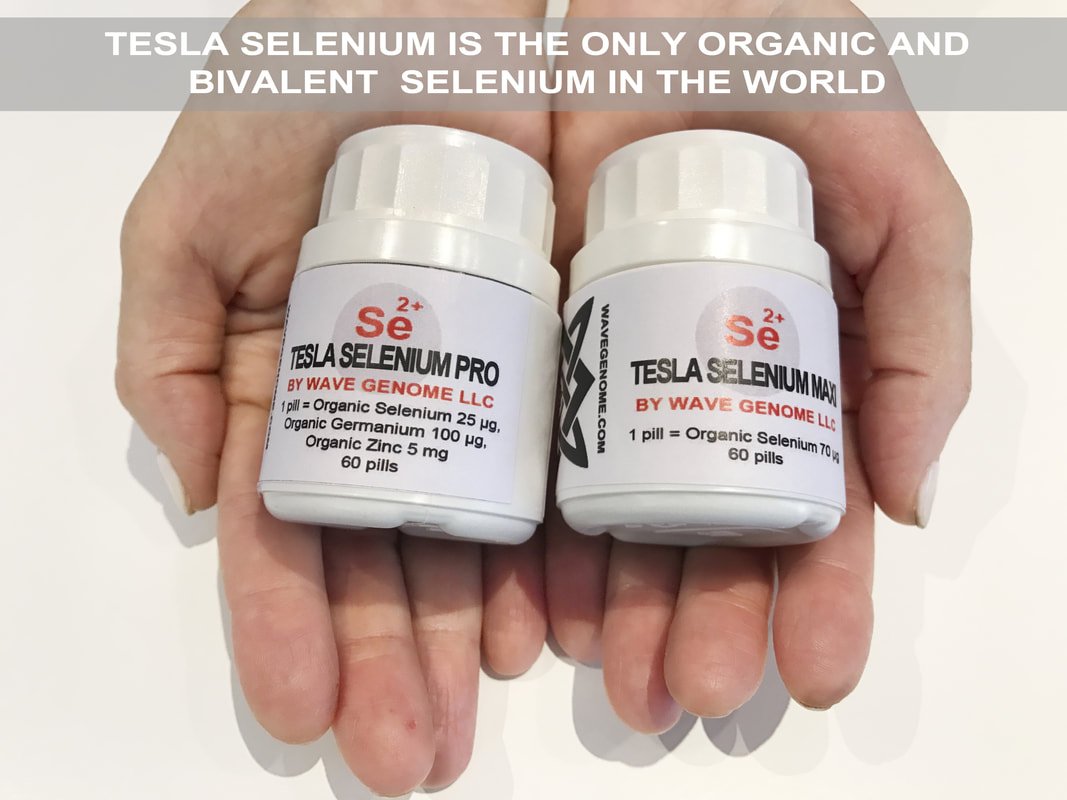On December 1st, 2022, Wave Genome LLC has released its new product — TESLA SELENIUM ABSOLUTE.
The protocol of restoring the Wave Optics in Chromosomes consists in two stages: (1) client should increase bioconductivity of his nerves (fatty tissue, for example, almost lacks innervation) via high intake of Wave Genome’s LLC Exclusive Biometal Tesla Selenium; (2) client, then, improves the coherence of his liquid Crystal media, based upon the improvement of the coherence of his Wave Crystal media (Wave Optics of Chromosomes) via using the electret-based Psi-generators. Thus, only the application of both Wave Genome’s LLC Tesla Selenium and Psi-generators gives the best result.
TESLA SELENIUM is the only Organic Two-Valent Selenium in the world. In the West, only six and four-valent Selenium is produced. And it is completely useless and very toxic (produces free radicals) due to the lack of the nullifying scalar wave between two paired electrons. We are electro-chemical batteries. And lack of essential Biometals is the major reason for cell deterioration, and, especially, neurological diseases. TESLA SELENIUM has demonstrated strong anti-cancer and even anti-AIDS properties in the multiple clinical trials on lab animals, agricultural animals and humans. It is simply a must-have product.
To increase the effectiveness of a conductor-analogous Tesla Selenium, a client needs to take in an electret-analogous flavonoid, such as Dihydroquercetin. This is true especially if a client does not wear a Wave Genome’s LLC electret-based Psi-generator.
Wave Genome’s LLC has combined these two supplements in its new product: Tesla Selenium Absolute — bivalent organic Selenium together with Dihydroquercetin. The combination of a conductor and an electret creates the effect of a capacitor, radically increasing the effectiveness of both supplements, when taken in together, rather than when taken each one on its own.
These two supplements when taken together effectively restore the crystal structure of cells’ liquid crystal media (Wave Optics of chromosomes).
TESLA SELENIUM ABSOLUTE Ingredients:
(1) Wave Genome’s LLC biometal conductor-analogous supplement — the only in the world bivalent organic Tesla Selenium to restore the nerve conductivity, and,
(2) Wave Genome’s LLC electret-analogous supplement — Dihydroquercetin (Flavonoid). Dihydroquercetin has proven its highest effectiveness in the recovery of COVID-19 patients.
One bottle has 100 pills. Each pill has 50 mg of Dihydroquercetin, and 50 μg of Organic Bivalent Selenium.
We produce antibodies by our digestive system. That is why TESLA SELENIUM ABSOLUTE is crucial for the recovery from COVID-19, vaccine injury, and long COVID.
Antibodies are the result of the formation of the scalar wave (the world is 93% energy and only 7% particles). The formation of the scalar wave is the very restoration of the crystal structure of cells’ liquid crystal media.
Here is an article of the effectiveness of Dihydroquercetin’s intake for treating a leaky gut:
https://chriskresser.com/quercetin-heal-leaky-gut/
And here is a scientific paper «Dihydroquercetin supplement alleviates colonic inflammation potentially through improved gut microbiota community in mice» in a peer-reviewed journal:
https://pubs.rsc.org/en/content/articlelanding/2021/fo/d1fo01422f

